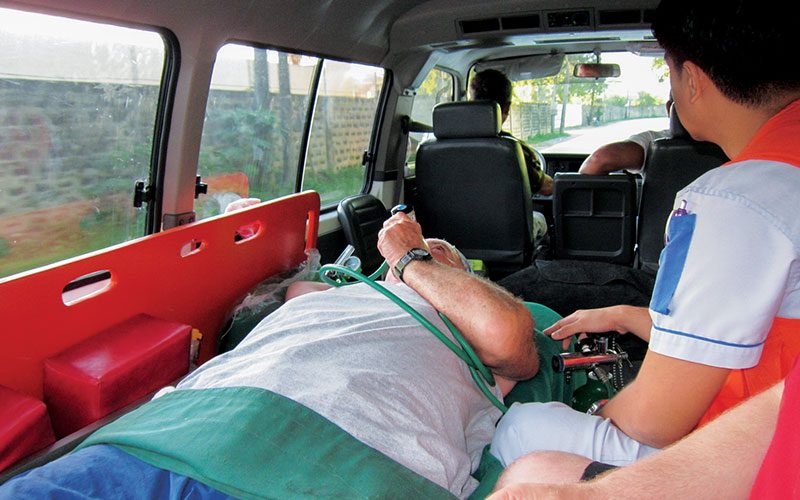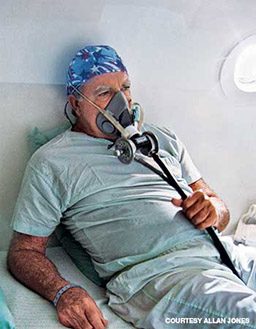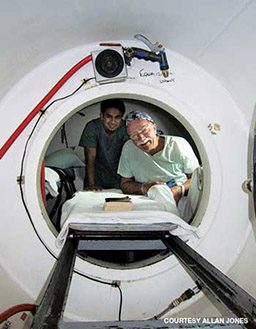It was late June, and my wife and I were nearing the end of a two-week dive trip in the Philippines. Our first week had been spent in the Anilao area photographing macro subjects. We did three dives each day on 32-percent enriched air nitrox (EAN). Each of us carried two identical Suunto computers, and we stayed clear of our no-decompression limits. On the eighth day we did not dive, instead transferring to the Puerto Galera area.
There our trip assumed a more relaxed pace, with spa treatments and hot lattes after the morning dives. And in line with this casual environment, we dived on air.
The third dive of the third day was close to the resort. Current was minimal, and the dive was uneventful. Soon after I surfaced, while waiting for the other divers to board the boat, I began to notice a dull pain in my back, just off center and slightly above belt level. At first I mentally pushed it aside, but it steadily increased in severity. “Oh no,” I thought. “I have a kidney stone.”

A quick double check of my computers confirmed that I was at least 10 minutes shy of my no-decompression limit during the last dive. As we pulled up to the dock, the pain was getting to me, and it took some effort to carry my camera rig up to the camera room.
The pain was somewhat higher and more centered than previous kidney-stone episodes I’d experienced. I never made it to the camera room with my wife’s rig. About halfway there I began to lose all sensation from the waist down, and I sat down in the nearest chair so I wouldn’t fall. I called to my wife, who in turn called for oxygen. Immediately the divemasters appeared with a dark green case just like the one I have been practicing with for the past 12 years as a volunteer diver at my hometown aquarium.
After three or four minutes on oxygen the pain subsided, and I regained full feeling in my lower extremities. In the short time since I called for oxygen, the resort had contacted the recompression chamber in Batangas and arranged for a private boat to make the two-hour transfer. The crew responded with a high level of professionalism and accident-management expertise. My wife quickly grabbed a few personal items, and, along with a resort manager and a spare oxygen bottle, we left for the chamber.
Waiting for us on shore was a private ambulance manned by a driver and a medical technician from the hospital’s hyperbaric department. Upon arrival at the hospital I was given a quick neurological examination and then, together with a technician, I entered the chamber for a U.S. Navy Treatment Table 6 — four hours and 15 minutes after the dive.

My wife and I stayed at the hospital overnight, and as a safety precaution I underwent a second Table 6 the next morning. I was discharged with the admonishment to not fly for three days and to avoid diving for 30 days. The doctor also suggested that I contact my family physician for a follow-up exam upon returning home. This was also a requirement of my volunteer work at the aquarium, which required a medical release after any pressure-related accident or overnight hospital stay.
Upon returning home I underwent a previously scheduled procedure to correct a minor abdominal hernia. After several weeks spent recuperating from that surgery I began working with a local hyperbaric doctor to obtain medical clearance for diving. He recommended a full spine MRI. The MRI showed some bulging discs in my thoracic spine. (Editor’s note: Bulging discs are not caused by decompression stress or decompression sickness.)
In mid-October we traveled to the north coast of Papua for two weeks of diving with whale sharks. During this trip I dived very conservatively, but I did enter and exit the water in full scuba gear.
After I returned home I took my medical reports to my family doctor and scheduled an appointment with an orthopedist who specializes in investigative and therapeutic spine treatments. Upon seeing the MRI he said, “There is nothing I can do for you; you need to see a surgeon immediately. You have two discs, T8/9 and T9/10, compressing your spinal cord, and if they continue to move you will be paralyzed from the waist down.” Ten days later I was in surgery for the removal of the two discs and fusion of three vertebrae with mechanical reinforcement.
I have always been active, diving for 35 years and off-road motorcycle racing for 16. In all that time, I experienced back pain only for the few minutes after the dive in June. It was not an easy decision to go into surgery without having pain, but when faced with the potential of being paralyzed I knew it was the right choice.

It has now been 60 days since my operation, and while I am sore from the procedure, which included rib cutting and lung deflation, I remain free of spine pain. The experience left me with many questions, including: Was it actually decompression sickness after my dive, or were the displaced discs irritated by heavy dive gear or the massage I had at the resort the day before? If I had been diving EAN would I have experienced the symptoms? I do not have the answers to these questions, and I am no longer seeking them.
My wife and I are longtime DAN® members. Renewing our membership and insurance was something we did automatically each year without thinking about the ramifications of a dive accident. But I can assure you that when I felt the pain after that dive, the foremost thoughts in my mind were, “oxygen, chamber and DAN.” The hospital billed DAN directly for all the costs of my treatment, and upon returning home I submitted and was fully reimbursed for the costs of the boat trips between the resort and the hospital. There were no questions about these costs — “just send us the receipt,” they said. DAN fully paid for the entire two-day episode.
Later this year when I return to the water, I will modify my dives to include always breathing EAN using air profiles (with an eye on the maximum operating depth of the mix) and skipping dives on the third day of extended trips. I am exceedingly grateful to the medical personnel who did not just write off my symptoms as simply DCS and conduct no further diagnostics. Had they not examined my situation in greater detail, I might have slipped a disc at some later date and permanently damaged my spine.
For the past 19 years DAN has been a silent partner on our trips, but when I needed help, DAN was there for me.
© Alert Diver — Q2 Spring 2014